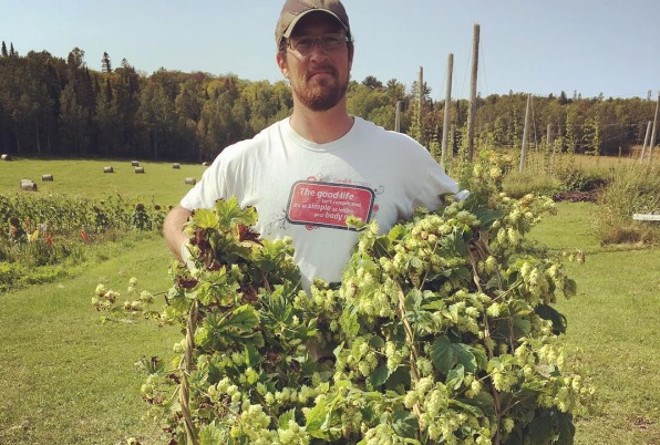From a 160-acre farm in Desbarats, just east of Sault Ste. Marie, a budding crop of leafy green hops is winding its way into local beers, infusing them with a unique, regional flavour.
Northern Skies Hops is the work of proprietors Robin Sutherland and Fred Post, a wife-and-husband team whose leap into the brewing industry was inspired by the launch of OutSpoken Brewing, a Sault-based brewery conceived by friends of theirs in 2014.
They came on board in the brewery’s earliest stages, helping to renovate the space, advising on product testing and development, and learning about various ingredients, including hops. Soon, they realized they wanted to be involved more directly in the process.
“It wasn’t so much a business decision as it was an interest and a passion,” Sutherland said. “Just seeing any opportunity to be part of the brewing industry in a different way.”
To get started, the couple ordered rhizomes from Manitoba, and those small root cuttings were planted to establish new vines. Hops grow up from the ground along cords that are strung between by poles, and in the first year, the plants reached heights of two to 10 feet.
Though they chose hardy varieties capable of flourishing in Northern Ontario’s cold climates, Sutherland and Post have had other issues to contend with. Several plants died in the first year due to wet weather, and leafhoppers – small, winged insects that suck the juices out of plants – have gnawed their way through more than one hop vine.
“At this point, our goal is to try to get to full capacity – try to get our current plants to full yield,” Sutherland said. “So, making sure we're dealing with pests and weather and weeds to make sure we're understanding the crop itself, and how to really get it to be as healthy as it can be, and then take that knowledge to double the crops.”
This past September marked the third full year of growing, and 300 plants, spanning eight varieties across a half-acre of land, are established and thriving.
During the harvest season in September, hops are picked from the vines by hand and put into an oast, a big drying rack that uses heat from a nearby wood stove to dry them out. When fully cured, the hops are then packaged and vacuum-sealed into half-pound and full-pound portions and frozen for future use. This year, the crop produced 30 pounds of hops.
“Really, even though you can get quite a lot of hops in terms of the volume, the weight is quite minimal,” Sutherland said. “But they don’t need a lot for each brew session.”
How much hops a brewer will use depends largely on the type of beer they’re brewing and how ‘hoppy’ or flavourful they want it to be. Currently, OutSpoken is taking all the hops Sutherland and Post produce, and could even use more, Sutherland said.
“The demand far exceeds the supply at this point,” she noted.
That’s why, even though breweries from across the province have inquired about sourcing their product, the pair first needs to increase their yield. The couple hopes to double their crop in the next two years, at which point they’ll consider expanding their offerings to other breweries across the North.
If their Northern-bred hops really take off, Sutherland said she and her husband will have to sit down and seriously consider the next steps, including whether or not they’ll try to make a go of farming hops full time.
Until now, Sutherland and Post have maintained their full-time careers in the arts and environmental fields, respectively. They also own an outpost camp, which they rent out to outdoors enthusiasts.
But support for their venture has been promising.
Funding they’ve received over the last two years through the Rural Agri-Innovation Network (RAIN) allowed them to purchase initial supplies to get started, and Sutherland praised the extensive network of resources available to startups looking to get into the agri-food industry.
“It’s really contributing to the local economy and it’s contributing to being environmentally friendly and sustainable because it’s all local food, so it’s just really nice to see that support,” Sutherland said.
“It’ll, I think, make it more possible for us to grow this because there is that push for these things to happen, which is really encouraging.”




